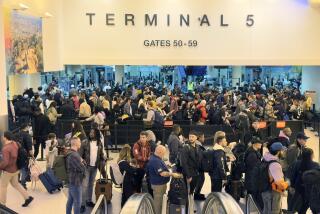It Must Be Summer . . . Airlines Slash Fares 30% : Travel: An unexpected lull in flight bookings prompts the major carriers to match discounts by Northwest.
- Share via
Hoping to give a lift to what they fear will be a lackluster summer travel season, major airlines followed Northwest Airlines’ lead by slashing fares up to 30% on Monday.
The discount fares--which follow similar cuts offered by airlines this spring--are good news for travelers, who so far seem to be staying closer to home and spending less this summer, according to travel industry officials. The airlines hope the discount fares will encourage consumers who have put off making summer travel plans to consider flying.
The sluggish air travel market, however, stands in contrast to most of the travel business, which has been moving ahead.
Summer travel nationwide is still expected to rise 4% from last year’s level despite the unexpected weakness in airline passenger traffic, according to industry analysts. Cautious consumers are once again expected to be attracted to low-cost, close-in vacation destinations and activities.
“People have substituted (road) trips for air travel,” said travel researcher Stanley C. Plog. Amusement parks in Orlando, Fla., music festivals and weekend getaways to small towns will gain ground this summer, Plog said.
Most major airlines--American, Continental, Delta and United--on Monday matched a 30% discount announced over the weekend by Northwest, which has six flights a day out of John Wayne Airport. Last week, airline stocks tumbled when American and USAir reported that passenger traffic--while running ahead of last year--was falling below expectations.
The latest fare sale has spurred some interest but not a deluge from travelers, said Barb Hamberger, spokeswoman for the Carlson Travel Network, the nation’s largest travel agency. Despite the current and previous summer air fare sales, “we are not seeing the big uptick that some people had predicted,” she said.
Still, something is better than nothing, according to a prominent Orange County-based travel executive.
“Any drop in air fares is going to stimulate travel,” said Tom Nulty, president of Associated Travel Management, a national travel company with headquarters in Santa Ana. “The market has been dormant and needed something to get them buying again.”
Many summer travelers, conditioned to expect a summer air fare war, have been waiting for the moment to buy their tickets. The price cuts are not as good as last year when “if you paid more than $99, you paid too much” but could be enough to tap the pent-up demand for summer travel.
Long-distance trips to Europe and Hawaii are losing ground to amusement parks and casinos, said James Cammisa, publisher of Travel Industry Indicators newsletter.
“When you have a lot of economic insecurity, people are more careful about impulse purchases, frivolous purchases or high-ticket things,” said Cammisa. “When you spend on travel, the money is here today and gone tomorrow. All you’ve got are some pictures left.”
More consumers seem to be waiting until the last minute to book vacations, hoping for summer fare wars and other discounts, said Judy Glunz at MLT Vacation, a Minneapolis-based tour operator.
“We are still booking June in June,” said Glunz. After a slow start, the flow of reservations has increased, and MLT has hired more agents to handle customer calls.
“We were concerned at first, but it has picked up,” she said.
Glunz added that bookings have also picked up for travel to Los Angeles, where the tourist industry has suffered through a three-year slump.
Last year’s half-off summer fare wars skewed traditional summer travel patterns. Not only did air traffic jump 12%, but the flow of air travelers also turned into a boom for auto rental firms and hotels that feed off airline traffic. Meanwhile, some motels and other roadside businesses experienced a sluggish summer as travelers took to the air instead of the highway.
This summer, however, domestic air traffic may actually decline as carriers have avoided deep discounts and cut back on capacity.
Times staff writer Chris Woodyard contributed to this report.
More to Read
Sign up for The Wild
We’ll help you find the best places to hike, bike and run, as well as the perfect silent spots for meditation and yoga.
You may occasionally receive promotional content from the Los Angeles Times.






